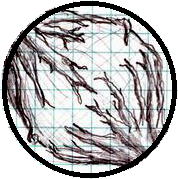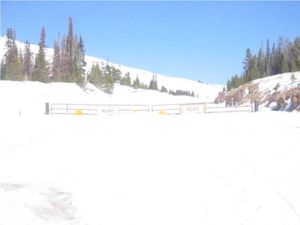Globalhash
This user earned the Globalhash achievement
|
The decimals generated by the geohashing algorithm can also be used to generate a single point on the globe instead of one for each graticule and this award celebrates those lucky or mad enough to pursue that single point.
To generate this point take the east-of-30-degrees-west decimals for a date (to make it global) and multiply the latitude by 180 and subtract 90, and the longitude by 360 subtracting 180. This will generate a single point on the globe which is today's only globalhash.
Proof is the same as any hash, but at the single day's coordinates. Good luck! The odds of the globalhash falling in your graticule are 1 in 64,800!
-60.967638095125,-46.595459748917
Globalcule
You can think of the entire surface of the Earth as comprising an analogous mathematical structure to the graticule, but much larger -- the globalcule! Every geohasher calls the globalcule their home (so far). The globalcule is bounded on the east and west sides by the antimeridian, to the north by the North Pole and to the south by the South Pole (the latter two a Mercator or similar projection shows as lines, but of course they are points; spherical geometry and all that). It has a vast area, made even vaster by the fact that it is not smooth (which of course makes the diminutive -cule in the name ironic). Most globalhashes in the globalcule would require the conditions for a water geohash achievement if completed.
Example
For 27 May 2005 (the day after the date shown in xkcd comic 426), the Dow open was 10537.08 (https://data.geohashing.info/dow/2005/05/27), so the W30-rule-modified-algorithm gave us the fractions 0.3465 and 0.07437 for latitude and longitude respectively (extra digits truncated thanks to https://data.geohashing.info/hash/2005/05/27). Multiply by the degrees in a globe and we see that the global hash is: 25.67229, 37.29761 (https://geohashing.info/t:map/2005-05-27) -- Tawala, Tabuk Region, in Saudi Arabia.
Locations
If you are using a map-based coordinate calculator, try zooming out to see the global point.
- Hashpoint lists or overview maps requested with the Small Hash Inquiry Tool always include the globalhash of today and upcoming dates as available.
- Eupeodes' map always has the globalhash on it, and can be made to display the subsequent known globalhashes by checking the box at lower left. As below, you may have to zoom out a lot to see it!
- The geohashing coordinator always includes the globalhash for the selected date - you may have to zoom out to see it. On the other hand, if you see any second marker in or around your graticule, you know you've struck gold.
- DAGAAG (Danatar's Approximate-Globalhash-At-A-Glance manual lookup map): If the online tool doesn't work and you want to avoid difficult calculations, just have a quick glance at the approximate location. Take the W30-adjusted coordinate offset (e.g. from the peeron map, but don't use American graticules) and compare it with the map using the black grid lines. If this gives a location at the other end of the world, you don't have to think about it any more, but if it is near you, you will have to use a calculator to get the exact location. See example here (for 2008-09-10 like in the other example above).
Winners
The following Geohashers have won this award, and have supplied proof.
- NWoodruff & LuxMundi - 2010-01-12 global
- Robyn & Wade - 2010-03-28 global
- Yann Vernier, Klas Meder Boqvist & Roos - 2011-08-29 global
- B_cereus at 2011-11-10 global
- Per S at 2011-11-30 global
- Katie Hess, Dale Mole, Joselyn Fenstermacher, Robert Schwarz, and Sven Lidström at 2012-02-26 global -- with Carl-Johan pulling the puppet-strings
- Hic Sunt Laganum - 2012-10-10 global
- Tilley at 2013-11-30 global
- Wijnland - 2013-12-29 global
- Rex Wolf, OtherJack, and Steve the pilot - 2014-07-10 global
- NWoodruff - 2015-04-19 global
- Micsnare, Patrizius, Crankl and B2c - 2015-07-21 global
- Codae, Crankl and B2c - 2015-12-05 global
- Crankl and B2c - 2016-02-03 global
- Thomcat and Jim - 2016-05-01 global
- thunk - 2016-06-12 global
- thunk - 2016-06-28 global
- NWoodruff and Million zillion - 2016-09-22 global
- NWoodruff - 2018-04-26 global
- NWoodruff - 2018-08-30 global
- Danatar, Leidenfrost, π π π, Jan and Fippe - 2019-12-15 global
- NightRose and her roommate - 2022-04-17 global
- Chandru and his friend - 2022-08-26 global
- Fippe, GeorgDerReisende, π π π, FelixTheCat, ΛΞ, Sov and rkschlotte - 2023-06-10 global
- Darkmatterisntsquirrels - 2024-02-22 global
Honorable mentions
- David Souther made it within 8 miles of the 2009-03-04 global hash before Mother Nature turned him back.
- Dvdllr attempted a Puppet Master globalhash on 2010-09-08, with limited success.
- Quaternary and friends made it to within 500 metres of the 2017-12-18 global hash on a reccy the day before, but entry was denied.
- GeorgDerReisende and DODO made it within 30 m of the 2020-02-21 global hash, but the location was in an abandoned hardware store.

